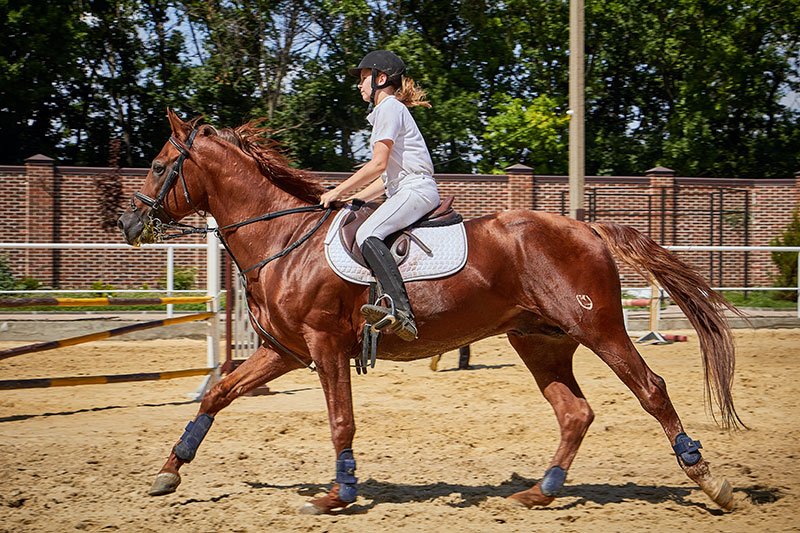Arthritis is a pretty common condition in horses, and it doesn’t only affect senior animals. Just like humans, arthritis can cause your horse significant pain and discomfort when they move.
While there is no cure for arthritis, there are a number of treatment options available that can help provide pain relief and increase your horse’s range of motion.
What causes arthritis in horses?
Arthritis is the result of inflammation in joints. It is typically caused by repetitive stress on these joints but can also be the result of trauma or infection.
We most often see arthritis in the knee, fetlock or hock; however, it can impact any part of a horse’s body including the spine, hips or even the jaw.
What increases the risk of developing arthritis?
While all horses are susceptible to developing arthritis, there are a number of factors that can increase the likelihood of developing the condition. This includes:
- Conformation of the horse
- Type of work the horse has performed
- Amount/intensity of work
- Age the horse started work – particularly if the growth plates weren’t fully formed
- Any acute injuries sustained
With horses being pretty large animals, over-exercising and excess weight can also put increased stress on the joints.
Arthritis is a progressive condition, so any wear and tear sustained over the course of your horse’s life will cause more joint stiffness and pain as they age. Therefore, it’s important to get advice from your equine vet on how to manage and treat your horse’s arthritis once you start seeing symptoms appear.
How do I know if my horse has arthritis?
Symptoms can vary significantly; some horses will show minor changes in their gait, while others will display a range of easily noticeable symptoms. Some of the more common indications include:
- Joint swelling and warmth
- Stiffness
- Lameness
- Work avoidance
- Changes in behaviour
- Tenderness in affected joint
- Muscle wasting
- Reluctance to pick up or turn
In making a diagnosis of arthritis, your vet will typically perform flexion tests to assess your horse’s joint function and range of motion, conduct a lameness exam and take X-rays. This will help to diagnose the severity of the arthritis in order to develop a treatment plan as well as rule out any other possible causes for your horse’s symptoms.
What treatment options are available?
Once your vet has assessed the degree of lameness and prognosis for continued work, they will formulate a tailored treatment program for your horse.
A range of short- and long-term treatment options are available for the management of arthritis.
Supplements and medication
Oral joint supplements are an important component in helping manage arthritis by supporting your horse’s joint fluid and tissues. There are however a growing number of supplements available – of varying quality – so it’s important to consult with your vet to ensure you are providing your animal with products that are going to have the best impact on their condition.
Another key medication often used to treat equine arthritis is Pentosan. This medication helps improve cartilage and joint fluid quality, increases blood supply to joints, plus has the added bonus of being an anti-inflammatory.
Intermittent pain relief
Arthritis can be quite painful for horses, so non-steroidal anti-inflammatory drug (NSAID) therapy is often used to help manage their discomfort. Oral NSAID medications are easily administered and are quite effective in making an animal feel more comfortable by reducing pain and inflammation. However, long-term continue usage can cause a range of complications, so it’s important to follow your vet’s recommendations on the use of this medication.
Joint injections
In some cases, your vet will recommend injections directly into the affected joint. This may be of hyaluronic acid, or as a last resort, corticosteroids. While such injections provide targeted treatment, they are not without risk or side-effects, so your vet will make their decision based on a number of factors; including whether your horse is still in work, the severity of their lameness, and any underlying health conditions.
What’s the prognosis once diagnosed?
A diagnosis of arthritis doesn’t mean that you won’t be able to continue to ride your horse, or that they won’t live a long and “normal” life. The long-term prognosis depends on the degree of lameness, the joint impacted and the type of work you expect for your horse in the future. Your vet is an important resource in helping to manage your horse’s arthritis not only in the short term but also well into the future to keep them living a comfortable life for as long as possible.
The Cameron Veterinary Services’ equine vets have extensive experience in treating arthritis in horses by helping to manage horses’ pain and have them moving as freely as possible.
To make an appointment with one of our vets, give us a call on 08 8318 1801.



